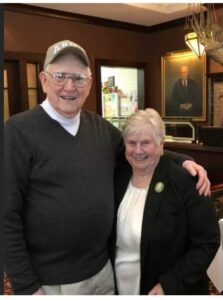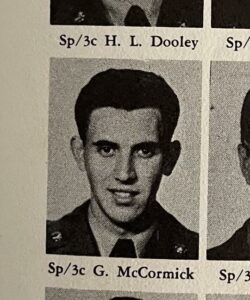 How conflicts on 2 continents brought a local vet and his wife together 6 decades ago
How conflicts on 2 continents brought a local vet and his wife together 6 decades ago
In December 1940, Liverpool, England, was raided for three nights, and half of the 140 berths at the Liverpool dock, vital in the Battle of the Atlantic, were put out of action in a May blitz six months later.
For Lily Moffitt, Liverpool was home. Born in 1937, Lily was the first daughter in her family. Before her, five sons were born to Lucy and William Moffitt. By the time Lily was 2, England was at war.
In 1939, both Lily’s mother and a younger brother died during his birth. With all able-bodied men called to war, including her father, and a city in ruins, Lily was sent to a Salvation Army children’s home.
“There is nothing like being raised by a mother and a father,” Lily recalled in a recent interview. “But at the home, we had a roof over our heads, a bed, good clothes, food and a proper education.”
Her brothers, however, were evacuated from Liverpool with more than 100,000 other children. They ended up on farms and in churches elsewhere in England and in Northern Wales.
Following the war, the children were eventually reunited with their father, and the family moved forward rebuilding their lives, literally. “There was no home to go back to. We had to start from scratch,” Lily said. At this point, Lily had spent 13 years in the Salvation Army home.
Meanwhile, 3,760 miles southwest of England, near Wilmington, North Carolina, George Albert McCormick was growing up in a sharecropper’s family where he attended school intermittently. Late in the spring, he helped to plant crops, and each fall, he missed school again to help with the harvest. “I went to school until 10th grade and then I knew I just had to get a job,” he said. George joined the Army in 1953 when he was 18 years old.
George shared, “I listed Spain among other places as my preferred location, and instead the Army told me, you’re going to Korea. I went to South Carolina for training and arrived in Korea in 1954. I quickly learned about poverty on a whole new level. We were rich on the farm in North Carolina in comparison.”
“The Army educated George and gave him an opportunity that didn’t exist for him in rural North Carolina at that time,” said Lily.
George arrived in Korea after the cease-fire armistice that ended the war between North and South Korea. “We were there to clean up so roads could be built.”
George felt a rapport with his new Korean community. “I was always making them laugh, and they taught me a lot about how to work.”
George stayed in Korea for 18 months cleaning up and maintaining inventory lists. “We had lists for everything. If there was something used by the military in Korea, we had a record of it.” George helped manage $14 million of inventory, nearly $160 million in today’s dollars.
When he returned to the U.S., his work ethic got him hired for several jobs before a cousin invited him to Connecticut to work for a swimming pool company. “When I started, I was managing the warehouse for the pool company. The skills I developed managing inventory in Korea were put to good use,” he said.
Back in Liverpool, 19-year-old Lily and her best friend, Joan, applied for work in the U.S. “I felt my options were limited in Liverpool,” she said. After being reunited with her family, her choices were finding work or staying home and tending to her father and five brothers. She and Joan decided America was the better opportunity.
Lily worked with a British agency that had a New York office to find a job as a domestic worker. Her new employer covered the cost of her transatlantic journey in exchange for one year of employment. “They asked if I knew how to do basic household chores. Growing up in the Salvation Army Home, I never did any chores, but I figured it couldn’t be that hard, so I always said yes.”
When Lily stepped off the boat in New York, her new employer, Mrs. Wilson, was there to greet her. She spent a year with the Wilson Family who offered to extend the job, but Lily had her sights on great adventures. “I had met other housekeepers over the year, and there were some who were headed for California. I craved adventure and was ready to go,” said Lily.
Before she headed west, the agency called her with an opportunity. “She told me there was a family that needed a housekeeper. Theirs, expected from Germany, was delayed due to a visa issue. They offered twice the salary until their expected staff arrived. “It was an offer I couldn’t turn down,” she said.
This temporary position was with the family who owned the pool company where George worked.
George and Lily met and eventually married. After many years of learning all aspects of the swimming pool business, George left the pool company and started his own. Building a services business in close proximity to New York City, he fielded calls from politicians, presidential family members and celebrities asking him to manage their pools.
Today, they live with their daughter and son-in-law in Warrenton. Their daughter, Jodi, also served in the Army and was last stationed at Vint Hill Farm Station.
Thousands of miles apart from war-torn Liverpool and the fields of North Carolina, George and Lily had an unlikely meeting in Connecticut. They have since raised four children, built a life together and achieved many of their goals. They recently celebrated 64 years of marriage.
“I owe so much to the military. Serving allowed me to better my position in life, an opportunity that I desperately wanted. My time in service also afforded me an education and life experience vastly different from my home in rural North Carolina,” George said. “I am very proud of my time in uniform and of the life Lily and I have built together.”
George McCormick is a Hero’s Bridge veteran. Hero’s Bridge is dedicated to serving veterans aged 65 and older by bridging veterans to a better quality of life through age-specific and innovative programs. These services are available to heroes wherever they call home, at no expense to them or their families. For more information, please visit www.herosbridge.org.
Reach Aimee O’Grady at news@fauquier.com
Read the story on Fauquier.com.

